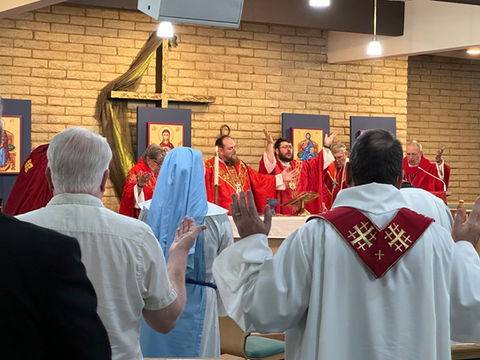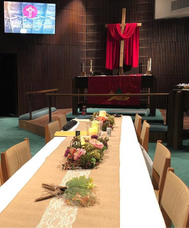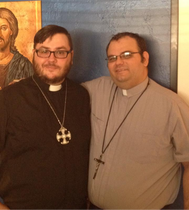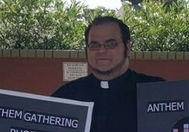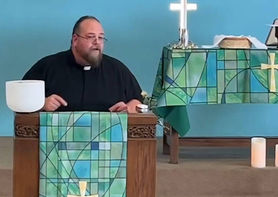Our Communion
The Convergent Catholic Communion is shaped by ancient faith, living worship, and an inclusive vision of the Church. We hold to the belief that the Christian tradition is deepest when Scripture, Sacrament, and Spirit remain together. We carry forward the gifts handed down by the early Church while listening for the Spirit in the present moment.
We are a Communion of people who believe the Church is strongest when its branches are connected to the same Root. Our aim is not to replicate old systems or imitate the structures of Canterbury, Rome or Constantinople. Our call is humbler. We gather believers, clergy, and communities into a fellowship where discipleship grows, ministry is shared, and Christ remains the center.
We are sacramental and evangelical, ancient and present, contemplative and charismatic. We are planted in the broad soil of the catholic tradition, watered by the life of the Holy Spirit, and shaped by the teaching and mission of Jesus.
Why We Exist
The Convergent Catholic Communion was born out of a desire to offer something rare in the independent sacramental world: a Communion with coherence, continuity, and community.
Many of our clergy and members come from the Independent Sacramental Movement (ISM). They carry deep devotion and pastoral gifts, yet often they also carry wounds:
-
repeated jurisdictional instability
-
unclear or inconsistent formation
-
leaders without accountability
-
sudden dissolutions and schisms
-
isolation disguised as apostolic freedom
The ISM contains sincere faith, but it often lacks sustainable structures that nurture long-term ministry or healthy clergy life.
We exist to offer a different path.
We exist so clergy and communities can grow in a Communion that is stable, accountable, transparent, and rooted in historic Christian tradition.
We exist to provide a home that values formation, collegiality, oversight, and pastoral care.
We exist to build something lasting - small, but real - so that Christ’s ministry is not buried under personality cults, competing jurisdictions, or isolation.
What we offer is simple: a place to belong, a structure to support you, and a tradition that will not collapse under its own weight.
Our Story

The Convergent Catholic Communion began with a small group of clergy and communities who shared a conviction shaped by convergence theology: the Church is not meant to live in fragments. The ancient sacramental life, the evangelical proclamation of the Gospel, and the charismatic movement of the Spirit were never meant to compete with one another. They are gifts meant to be integrated — not separated.
Our early leaders were formed by different traditions. Some came from liturgical churches, others from Pentecostal or evangelical backgrounds, and many from the ISM. What united them was the sense that the Spirit was calling them to build something coherent and sustainable.
From the beginning, three values defined us:
1. A stable foundation for convergence theology.
Convergence isn’t a style. It isn’t a blend of random liturgical preferences. It is a whole vision of the Church where the catholic, evangelical, and charismatic streams form one river. We committed to grounding that vision in historic faith and communal life.
2. A Communion shaped by relationship, not hierarchy.
We wanted a structure where leaders actually know and support one another. Oversight is pastoral, not punitive. Authority is shared, not hoarded. Bishops are servants of unity, not collectors of titles.
3. A home where clergy and communities flourish.
Ministry is too heavy when carried alone. Our Communion exists to form clergy, guide communities, nurture vocations, and sustain faithful service over a lifetime.
The Communion grew slowly - by design. We chose depth over width. Integrity over speed. Relationships over numbers.
What Makes Us Different
1. We are catholic in faith, but not Roman in structure.
We maintain apostolic succession, uphold sacramental life, honor ancient Tradition, and pray in continuity with the wider Church. But we do not adopt the centralization, cultural expectations, or clericalism of the Roman system.
Our catholicity is relational, historical, and sacramental — not bureaucratic.
2. We offer real accountability, not authoritarian control.
Many arrive frustrated by bishops with no oversight or clergy with no formation. We do things differently.
We expect:
mutual submission
supervised ministry
clear standards
ongoing formation
pastoral evaluations
Our oversight protects the Communion and protects you.
3. We take convergence seriously, not cosmetically.
Convergence is not “liturgy with guitars.” It is a theological commitment:
The catholic stream gives us sacraments, liturgy, apostolic continuity.
The evangelical stream gives us Scripture-centered preaching and mission.
The charismatic stream gives us prayer, renewal, and the Spirit’s gifts.
These streams form a single identity — not a patchwork.
4. We are inclusive without abandoning catholic tradition.
We believe the Church is strongest when every baptized believer can find belonging. Our openness flows from our understanding of grace and the incarnation. The Eucharist is not a reward for the perfect but nourishment for the faithful.
5. We operate as a Communion, not a personal ministry.
We are not built around one bishop, one personality, or one parish. We are built around shared governance, a living Constitution, a Council of Bishops, a General Council, Connexional structures, and a common Rule of Life.

What We Believe - Core Commitments
Scripture and Tradition
We hold Scripture as the authoritative witness to Christ. We honor Tradition as the living memory of the Church, interpreting Scripture in continuity with the Fathers, Councils, and apostolic teaching.
The Trinity
The mystery of Father, Son, and Holy Spirit stands at the center of our worship and life.
Jesus Christ
We confess Jesus Christ as Lord, fully God and fully human. His incarnation reveals the heart of God. His death and resurrection redeem creation. His presence fills our worship.
The Holy Spirit
The Spirit empowers prayer, healing, discernment, mission, and renewal. The Spirit guards the Church from error and awakens the gifts needed for our time.
The Sacraments
Baptism initiates us into the Body of Christ. The Eucharist sustains us. The sacramental life shapes our identity, not as rituals or obligations, but as encounters with Christ.
Apostolic Succession
Our bishops stand in historic continuity with the wider Church — not as a mark of superiority, but as a symbol of unity and fidelity to apostolic teaching.
Mission
We exist to share Christ’s peace, serve our communities, pursue justice, and preach the Gospel with clarity and compassion.
How We Worship and Live
Our worship reflects our identity: ancient, alive, and grounded.
-
We gather around the Eucharist.
-
We proclaim Scripture with clarity.
-
We pray in the power of the Spirit.
-
We honor both the stillness of ancient liturgy and the freshness of charismatic renewal.
-
We welcome cultural diversity in worship style.
-
We encourage participation and formation.
Some of our communities are Eastern in tone, some more Western, some blend traditions. All are united by sacramental life, Gospel preaching, and openness to the Spirit.
Our life together is not just liturgical. It is pastoral. We walk with one another. We support vocations. We train clergy. We foster healing. We create spaces where faith grows — slow, steady, and real.

Our Polity: Connexional, Not Hierarchical
We adopted a Connexional structure because the early Church organized around relationship, oversight, and shared mission not territorial power.
In our Communion:
-
Connexions gather communities under shared charism and oversight.
-
The Board of Bishops serves to guide, not control.
-
The General Council brings clergy and laity into discernment.
-
Accountability is pastoral, not punitive.
-
Authority is shared, not concentrated.
This model avoids the rigidity of high-hierarchy systems and the chaos of hyper-independent structures
Where We Fit
We honor the Church in all its expressions: Roman, Eastern, Anglican, Protestant, and independent. But we are not attempting to recreate any single tradition.
We are a home for those who see truth in many streams of Christianity and desire a place where:
-
ancient liturgy
-
sacramental life
-
charismatic renewal
-
evangelical mission
-
inclusive belonging
can breathe together without tension.
For Those Who Come from the ISM

You may be discerning your next step. You may feel tired, hopeful, skeptical, or searching.
Here is what we promise:
-
We will not use you.
-
We will not isolate you.
-
We will not elevate you without formation.
-
We will not bury you under titles that mean nothing.
-
We will walk with you.
-
We will ask real questions.
-
We will support your vocation with honesty and depth.
You do not need to leave behind your history. But you may find here a healthier, more grounded way to live your call.
An Invitation to Explore
If you sense the Spirit drawing you toward this Communion — whether as a seeker, a leader, or a community — reach out. Ask what you need to ask. Tell us your story. We are a Communion built on relationship, integrity, and hope.
You are welcome to explore this path at your own pace.












